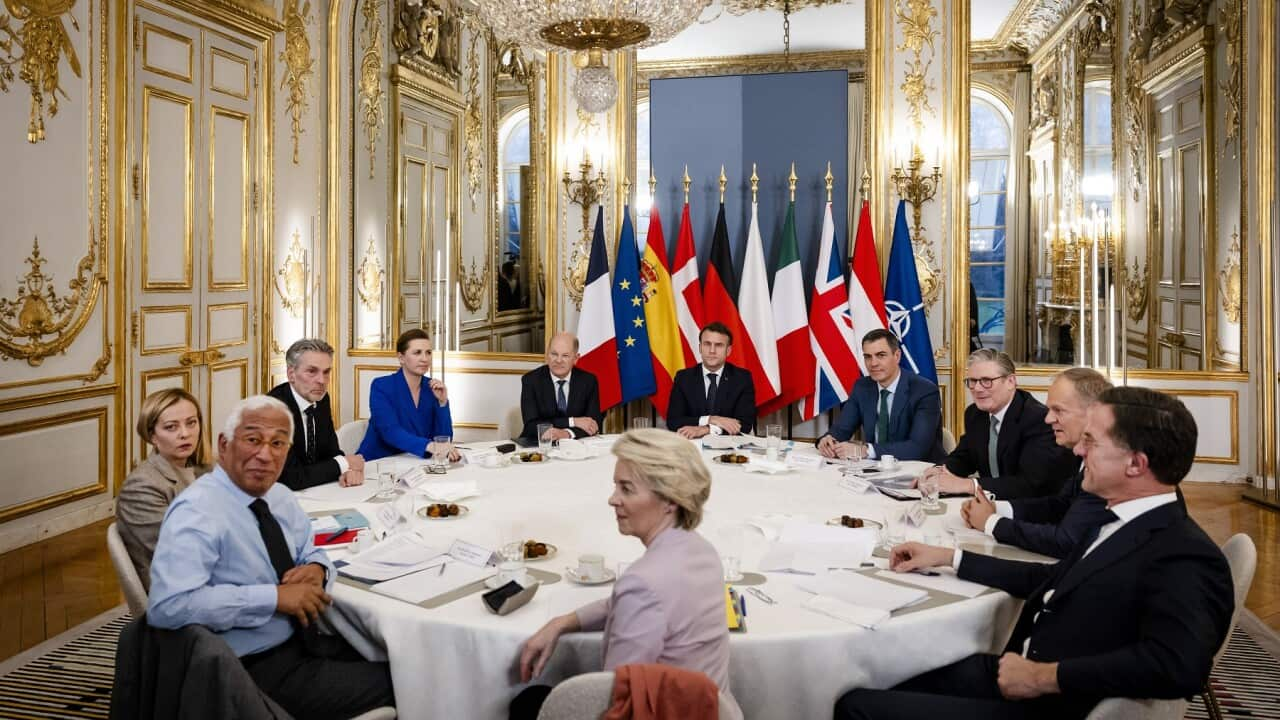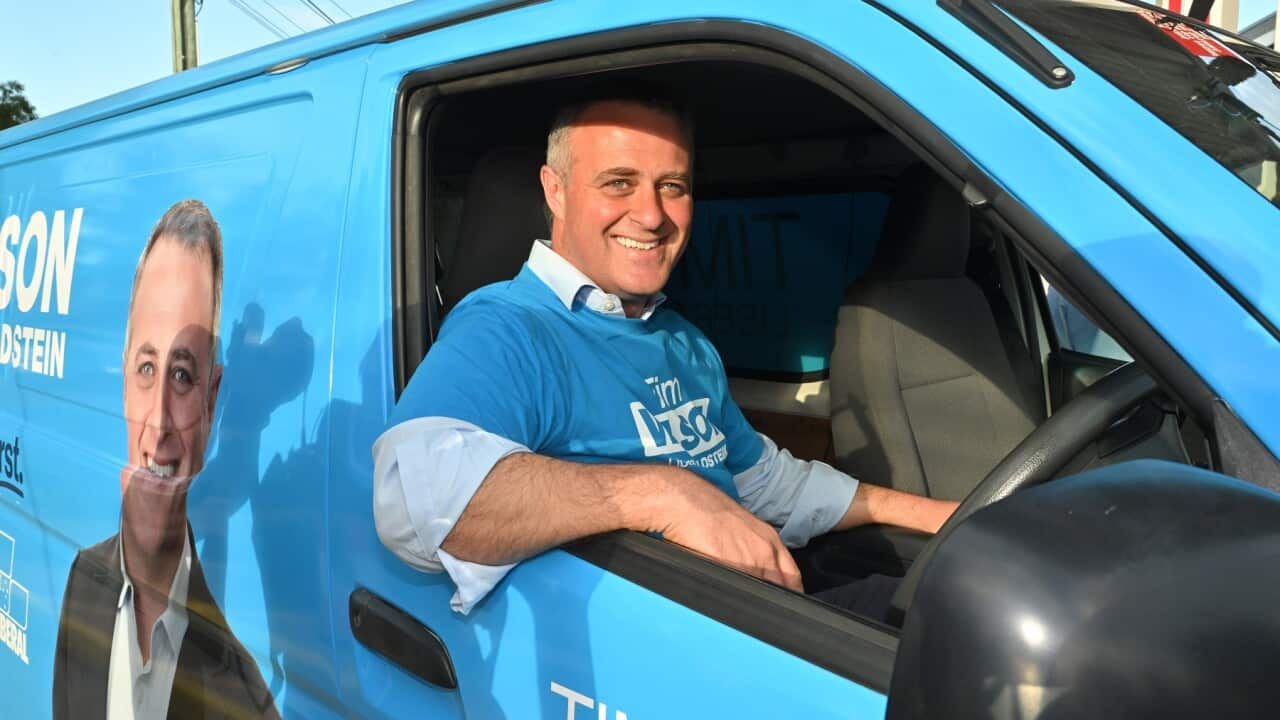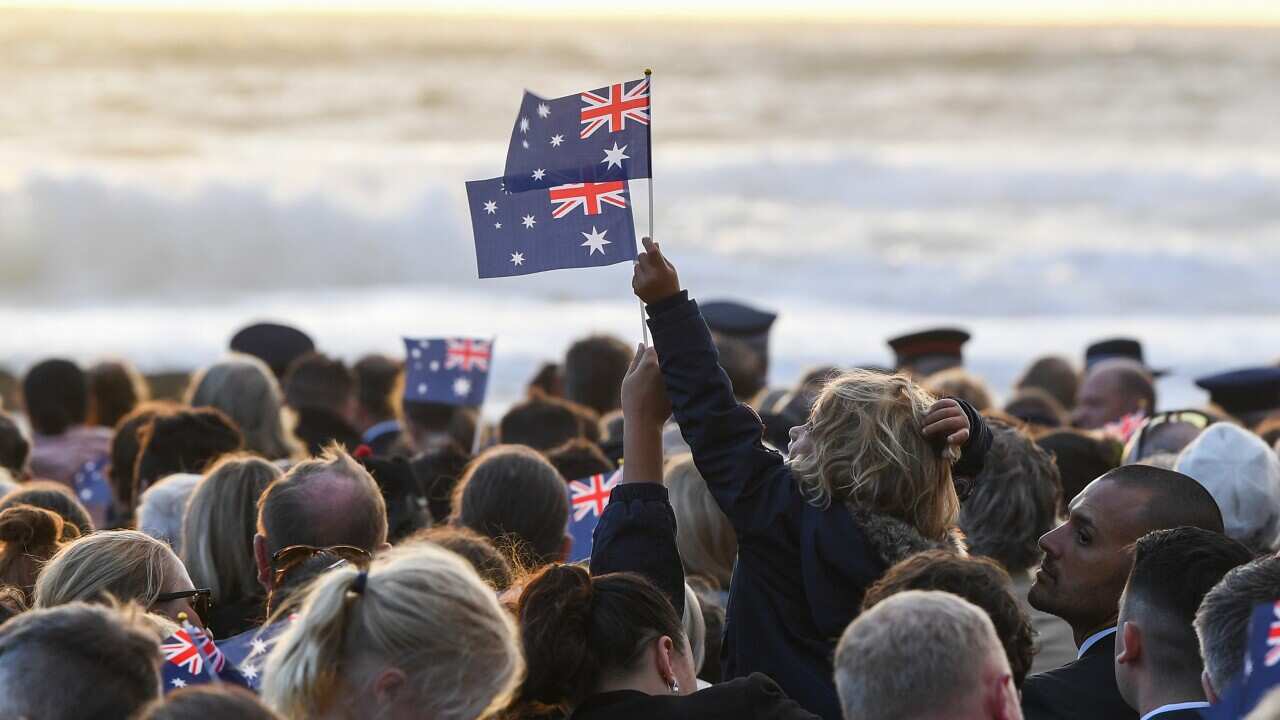TRANSCRIPT
"In this moment, we have to recognise the new era that we are in, not clinging hopelessly to the comforts of the past. It's time for us to take responsibility for our security, for our continent."
After three hours, Emmanuel Macron bid farewell to NATO and E-U leaders on the steps of the Elysee [[El-ee-SAY]] presidential palace in Paris.
They had been summoned with little notice, to discuss the rapidly evolving situation on both sides of the Atlantic; with the American president and Russian leader poised for peace talks on Ukraine.
French President Emmanuel Macron hosted leaders from Germany, Britain, Poland, Spain, the Netherlands and Denmark, along with the European Union leadership and NATO Secretary General.
Speaking after the meeting, British Prime Minister Keir Starmer says Europe must recognise the seriousness of what is at stake.
"I want to thank President (Emmanuel) Macron or convening us this evening. At stake is not just the future of Ukraine. It is an existential question for Europe as a whole and therefore vital for Britain's national interest. This is a once in a generation moment for the collective security of our continent. Only a lasting peace in Ukraine that safeguards its sovereignty will deter (President Vladimir) Putin from further aggression in the future."
The emergency meeting came as European leaders were still reeling from U-S Vice President J-D Vance's criticism of the E-U at the Munich Security Forum.
European leaders were taken aback by Mr Vance’s speech criticising Europe’s exclusion of far-right groups from power, and the sudden U-S plans to begin peace talks with Russia without the presence of Ukrainian or European officials.
After the meeting drew to a close, German Chancellor Olaf Scholz [[sholts]] told reporters he welcomes moves towards a peace deal.
But, he says negotiations without Ukraine present are highly inappropriate.
GERMAN THEN ENGLISH VO** "There must be no division of security and responsibilities between Europe and the US - which means that NATO is based on the fact that we always act together and are at risk together and guarantee our security through this. And that must not be called into question. We must keep that in mind.”
Ahead of the meeting in Paris, French officials say Emmanuel Macron had a 20-minute phone call with President Trump, though they did not disclose the details of the call.
While the U-S has ruled out putting U-S troops in Ukraine, European officials say the Trump administration has not ruled out supporting a European force and has asked what kind of backing might be necessary.
Officials briefed on the European requests to the U-S say they include intelligence, surveillance and reconnaissance capabilities, and potential air cover or help with air defences.
Prior to the meeting in Paris, Keir Starmer announced that Britain is ready to deploy troops in Ukraine as part of a peace deal.
"On defence, It's clear the US is not going to leave NATO. But we Europeans will have to do more. The issue of burden sharing is not new, but it is now pressing. And Europeans will have to step up, both in terms of spending and the capabilities that we provide"
Alongside Britain, France has also stated that it that it won't rule out a troop deployment if necessary.
European officials told The Washington Post that France has done more advanced military planning than others, and estimates that it could commit nearly 10,000 troops.
Swedish Prime Minister Ulf Kristersson [[OOLF KREE-stur-suhn]] says he is open to the idea.
"We will take part in those discussions and of course that is absolutely a possibility. There needs to be a very clear mandate for those forces and I don't think we can see that until we have come further in those negotiations. But Sweden, we are normally a part of strengthening security in our part of the world, so I foresee us to be a part of that this time as well."
Other European allies, however, have been less enthusiastic, with some dealing with constrained militaries.
Polish Prime Minister Donald Tusk [[toosk]] says while Poland is willing to support efforts, they will not be sending troops.
Leaders elsewhere in Europe were not so supportive.
Hungary's Prime Minister Viktor Orban [[aw-bn]] says he welcomes the discussions between Russia and the U-S, accusing European officials of missing their opportunity to act.
HUNGARIAN THEN ENGLISH VO**"We urged several times the big countries of the EU, Hungary cannot take on that role, but the big countries should have made moves in the last three years towards peace but they got stuck in the side of the war. And in vain we urged them to come over to the side of peace but they did not do it. And now we can watch from the outside how things that are most important for us are being done without us.”
As well as concerns that Ukrainian and European leadership is not involved, leaders also say a fragile ceasefire without a peace deal could leave the entire region worse off.
Danish Prime Minister Mette [[meh-tuh]] Frederiksen warns that if Europe fails to secure itself now, Russia will not stop at Ukraine.
“I have never believed that the war in Ukraine is primarily about Ukraine. It's about Russia. And it's about the imperial dreams about building a stronger and a bigger Russia. And I don't think they're going to stop in Ukraine. And therefore, I am very concerned about making a fast ceasefire because it can actually give (Russian President Vladimir) Putin and Russia a better possibility to go back to Russia and to re-ramp and to mobilise again, attack Ukraine or another country in Europe.”
As Donald Trump's foreign policy advisors gather in Saudi Arabia for a meeting with Russian counterparts, U-S Senators in Kyiv are attempting to ease concern about Ukraine's exclusion.
North Carolina Senator Thom Tillis says the upcoming talks are only preliminary.
"Of course, they (Ukraine) have to be at the table. There are thousands of people who have given their lives to defend this country. Does anybody really believe that the United States would negotiate an agreement with a European nation that's done what they've done on the battlefield, that's suffered what they have and not be at the table? Of course, they will and you'll see that in the coming weeks and months."
And while fears mount about Europe's readiness for the security shift brought on by the Trump administration, Russian officials argue Europe has shown little commitment to ending the war.
Russia's Foreign Minister Sergei Lavrov says European countries don't really want peace.
RUSSIAN THEN ENGLISH VO: "The European philosophy hasn't gone anywhere, so I don’t know what they should do at the negotiating table. If they are going to weasel out some cunning ideas about freezing the conflict, while actually intending, as is their custom, nature, and habit, to continue the war, then why should we invite them at all?"
Russia's ambassador to the U-N Vassily Nebenzia says the United States is finally bringing diplomacy to efforts to end the war.
But Ukraine's ambassador to the U-N, Khrystyna Hayovyshyn, says a weak ceasefire agreement will not end the war.
“Weak agreements will not bring real peace; they will only lead to the greater war. That is why we are working with our partners to find strong and effective solutions. Peace cannot be bought, especially not at the expense of law and principles, especially principle of territorial integrity and sovereign equality. This cannot be replaced with appeasement. History offers many relevant examples. Our task is to avoid repeating past mistakes, as the cost of those mistakes is more blood, suffering and destruction.”













